Student Blog
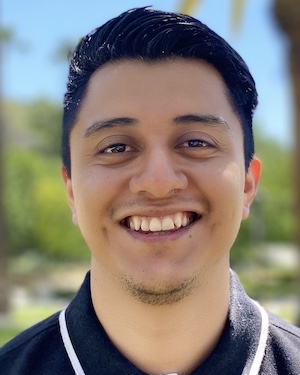
My Support System ⟩
October 26, 2020, by Daniel
This past week I received the best news ever, “WE” passed the NBCOT exam! The reason I say “WE” is because I attribute every big accomplishment to my support system. Yes, they will always say that I’m the one that put in the work but I feel that my accomplishments are and always will be a collective effort. Where I come from, it often takes a village to do what very few have done before. This past weekend made me reflect back on my support system and their unconditional love and support. I have been fortunate to have people in my corner every step of the way. Being the first person in my family to go to college came with a set of challenges that at times felt unmanageable. From thinking college wasn’t an option in high school to now being in the OTD Program it has been a long journey to say the least. Last Wednesday, when I opened that email with the NBCOT score, I felt a sense of relief as well as gratitude because I know what it took for me to get here, to be one huge step closer to being a fully licensed OT. This is much bigger than me because it goes back to the hardships my parents and my community have faced.
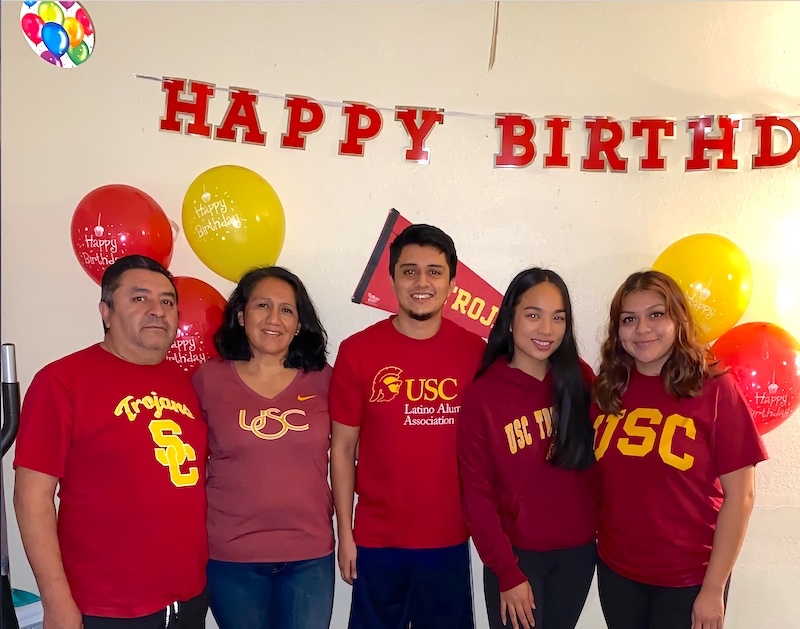
There have been moments in the last couple weeks when I felt defeated while taking classes, completing my residency, going through life, and studying for the NBCOT. It is in these moments that it helps to lean on your support system. Whether that is your family, significant other, friends, classmates, mentors, school organization, etc., it is good to know that there is someone there for you. Having people checking in on me, giving me good vibes, and understanding that I had to spend almost every day studying helped me get closer to the finish line. Sometimes a quick encouraging text can go a long way for someone. And I think this has been the theme of my entire college career, having people that cared enough to make sure I was doing okay mentally, emotionally, and physically. Today I want to simply thank every single person that has made an impact on my journey. The list is too big to add on here today but you know who you are.
This year has been such a unique year as we had to completely change our lives. It has been a year of ups and downs, and times full of uncertainty. All of this plus the responsibilities we still have on a daily basis can make anyone feel overwhelmed. If you ever feel like you are just drowning in school work and other responsibilities, take a moment to reflect on how far you have come. Remember those long nights when you used to have conversations with your loved ones about going to OT school and now you’re here. Hold on to those moments and use them when times get tough. When things don’t go your way, take time to feel those emotions, heal, and when you’re ready get back to it because there is always more than one path. Know that regardless of the outcome your support system, your village, your people, will be there to help you get back on your feet. They will not judge you, and instead will respect you and care for you. Now more than ever it is important to stay connected to your support system. Spend time with those people, whether that is in person, FaceTime, Zoom, whatever way you can. One thing I have learned is that accomplishments always feel best when you can share them with the people that were there along the way. Lastly, take all those lessons you learned along the way and support others.
⋯
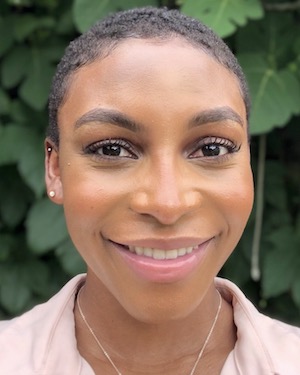
Working with Real Clients (not actors) ⟩
October 23, 2020, by Lamoni
During your time in the Master’s Program and in the Adult Rehabilitation immersion, specifically, you will have several opportunities to work with actors that will serve as your client. This allows you to practice the techniques that your instructors and textbooks have been talking about. It is pretty nerve wrecking in the beginning because you do not want to “mess up.” But this is technically what they are there for. If you do it incorrectly the first, second, third time, it is okay. Each time that you practice, you get closer to using the correct form or using the correct language. The great thing is that the actors give you feedback too! You do not have to wait until your professor comes over. The actors will let you know if your directions were not clear or if your position was awkward and what you should try next time.
While it is great practice to have those actors as clients, it definitely does not compare to working with actual clients. During my Level I fieldwork at a hospital, I was presented with new challenges that I had not thought about. Clients would ask questions that I did not have the answers to, they would get off track and sometimes it was difficult to redirect them, and there were times when they said things that were a cause for worry. However, my clinical instructor was always right there to guide those situations. For the most part, I was observing and taking mental notes.
Due to COVID-19, the structure of the program has changed. Instead of doing my first Level II fieldwork during the summer, I will not be starting until the spring. That means that I went a couple of months without seeing a client (whether real or an actor). I was feeling rusty. However, I have had the perfect opportunity to work in the middle ground during this semester! My elective, Enhancing Motor Control for Occupations, has in-person sessions and involves volunteer clients!
We began this course by discussing what we would cover and how everything would be laid out. The purpose of the course is to provide an in depth understanding of “principles and methods for remediation of motor control problems following upper motor neuron lesions” (OT574 Syllabus, 2020). The perspective of the course is to examine the ways that occupations are impacted for adults with hemiplegia. Our first two classes covered pelvic and trunk assessment, scapular assessment, and shoulder alignment. We had practiced facilitations and mobilizations on our assigned partners which were other students in the class but because everyone had normal strength and movement (and none of us were trained actors), it felt rather . . . easy? It took some time to get the proper form but other than that, the client (ourselves) was simple.
After those first two classes, our volunteer clients arrived! The client that I was assigned to had a much different presentation than my classmate. While my partner is 5’6 and no more than 130 pounds, my client, Chuy, was 6’1 and over 300 pounds. He had a stroke a couple of years ago and presented with left side hemiplegia that caused weakness in his arm and flexion in his hand. He wanted to be able to tie his shoes and zip up his jacket independently. He had very functional goals and it was time to help him achieve them! Our interventions were completed through both in-person and Telehealth sessions. Every week, we had an entire two hours to work with our clients. Afterwards was the lecture portion by our instructor Remy Chu.
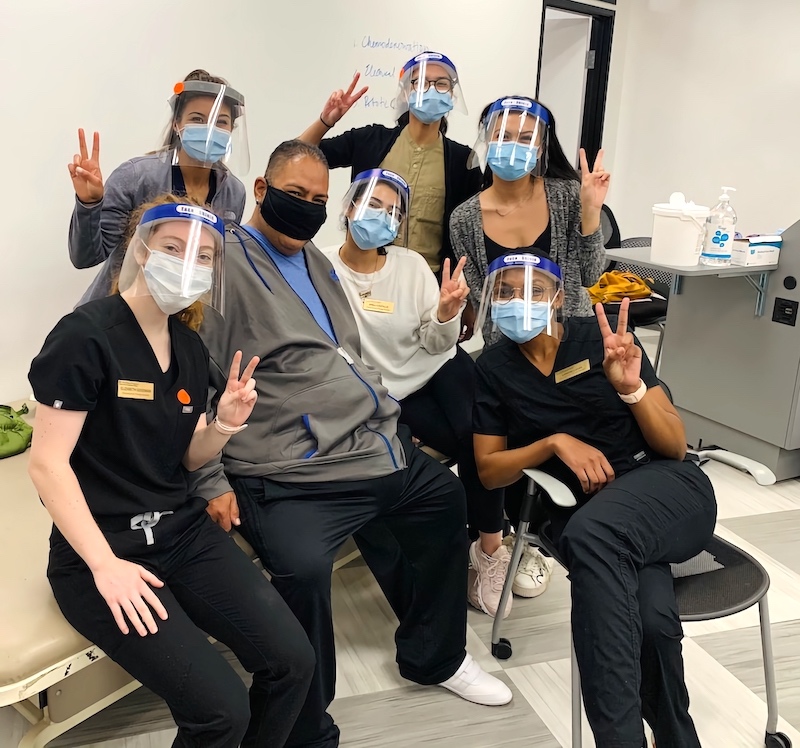
Group photo of my team and Chuy! (Left to right: Elizabeth Goodman, Sydney Bast, Emeli Castillo, Daphne Carcedo Cravens, Brianna Hernandez, and Lamoni Lucas)
The last session with clients ended this week; we wrote discharge notes and gave them home exercise plans. Spending time with clients in this environment was an amazing opportunity. Everything we learned in lecture was being applied on the spot. And none of the clients had to pretend that they had weakness or impaired sensation or limited range of motion because it was actually the case. Therefore, by the end of our time with them, we were able to see real progress! We started and ended our time with clients by recording their movement and the how they performed their goal. We were able to compare them at discharge to how they were at baseline. In our last session which was through Telehealth, Chuy independently tied his shoes and with a big smile, asked “did you see that?!” It was such a rewarding feeling! I almost shed a tear. That feeling is not something that actors can provide. When working with clients, I am constantly reminded of why I chose this field.
⋯
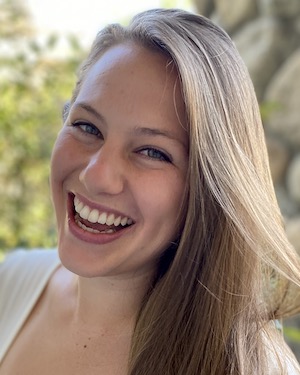
Interview with Pediatric OT Dani Lurie OTD, OTR/L ⟩
October 21, 2020, by Savi
This weekend I got the opportunity to sit down with my sister Daniella Lurie OTD, OTR/L, or Dani Lurie, and learn more about her time at USC and her journey to becoming a pediatric occupational therapist. Throughout my lifetime I have had the privilege of accessing my sister’s life experiences and advice. These have been integral to my success as a current student and I thought it would be valuable to share some of her words of wisdom with you all! Dani graduated from USC Chan with her Doctorate in 2017 and has been working in pediatrics ever since. She currently works in a pediatric occupational therapy clinic and conducts treatment sessions both in person and through telehealth. Below you will find Dani’s responses to my questions. A huge shout-out to my biggest role model for taking the time to share her valuable insight with me and with all the future occupational therapists reading.
Why did you pick Occupational Therapy (OT)?
I have always been interested in working with people and was excited that OT combines both science and social science and focuses on mental and physical health. I volunteered in pediatric clinics during my undergraduate career at UCLA and that solidified my love for working with children and their families. All of my courses in college focused on developmental and abnormal psychology as well as statistics. I grew to love all of these subjects and was thrilled to realize how integrated all of these concepts were in OT. OT incorporates statistics into research and goal tracking, as you need to evaluate patients’ progress in a statistical manner. I enjoy that there is a quantitative reason for everything we do and there are science and research backing our treatment approaches and techniques. OT beautifully combines both my passion for science and my desire to work with people to help them achieve their goals.
Why did you choose to work in Pediatrics?
I worked with kids for my whole life. Whether it was tutoring, instructing dance classes, babysitting, or volunteering, I always found myself gravitating towards jobs that allowed me to work with children from high school onwards. I enjoy that children keep you grounded because they live in the present moment, whereas adults are always on the go thinking about what’s next. The goal for any type of work with kids is surrounding play and having fun. This emphasis was good for me emotionally, as it is therapeutic to surround yourself with people who focus on the present. It’s also really fun to play games all day and work on goals indirectly. Although I don’t consider myself the most creative person, I think working in pediatrics has stretched my imagination. I also enjoy working with parents because I get to utilize more of my psychology background from college by focusing on their mental health and their relationships with their children.
Why did you choose USC and how has that choice benefitted you after graduating?
It’s been really nice having students come from the program I went to because I can work to build their skills from a perspective of understanding. The Chan division has provided me with a nice network of people with common interests and pursuits. I decided to go to USC because the professors are outstanding, especially for my specific focus area interests. Dr. Erna Blanche has been the biggest inspiration for my whole career, and I am so grateful to have had her as a mentor and teacher. All of my Sensory Integration (SI) and pediatrics professors, including Dr. Joan Surfus and Dr. Janet Gunter, are so in love with what they do and that passion rubs off on their students. The pediatric professors have the ability to be in the present moment even with each other. In class, we would get down on the floor with our professors and play in order to understand what it actually means to have fun. We also focused on understanding why these things matter neurologically. Another big reason I chose USC was because the Chan Division is one of the top players in OT research. All of my professors participated in research and so we were taught the most up to date and relevant information in class. People come all over the world to take special topics in SI, a four-course series that I was fortunate enough to take during my time completing my master’s and doctorate. At USC I learned why it all matters and how to quantify what we are doing in therapy. I had an amazing experience receiving mentorship in my field of interest in order to become proficient in my practice.
Why did you pursue your OTD?
I am interested in teaching down the line and I wanted to specialize in SI. After I graduated from the Master’s program I was a competent generalist. I wanted to continue on to the Doctorate in order to focus on continuing education in SI to become the specialized therapist I wanted to be. During the OTD I researched the key components to effectively evaluate sensory modulation and praxis to become proficient as a clinician in this area.
Do you have any advice for current students?
Focus on where you’re at instead of worrying about where you think you are supposed to be. Once you graduate you will find a job that’s right for you. While I was completing my degree, I felt a lot of stress to figure it all out before I graduated, but you don’t have to. After I graduated, I got a job in both pediatrics and home health at the same time, so you have the opportunity to try different settings out and continue hopping between them throughout your life as your interests change. While you are at USC you are getting a broad skill set and if you trust the process you will eventually find a job you love!
Do you have any advice for students entering into fieldwork?
Keep an open mind even if you think you’re 100% focused on a particular practice setting . . . another setting might surprise you! I still look back on my adult rehabilitation fieldwork II rotation for some things I can utilize in my pediatric practice. There are different skills you gain while you’re there so you should definitely make the most of wherever you are. There is a reason why you work in at least two different settings before you graduate, so be present and learn as much as you can.
What is the hardest part of your job?
It is hard to say goodbye to kids at the end when they graduate because I never know when I’ll see them again. Another difficult part of my job is the quantity of paperwork I must complete on a daily basis. I love participating in evaluation and treatment sessions, but writing evaluations and notes is extremely time-consuming. Written evaluations and detailed notes are important and support our process, so it is pertinent to spend time ensuring that they are concise, thorough, and reliable. It can also be difficult for me to effectively communicate with everyone on the treatment team because they are not always in house, especially now that we are primarily virtual. I am definitely more of a face to face communicator.
What is the best part of your job?
The best parts of my job are the day to day little signs of progress. When a kid says “I can do it” or can all of a sudden write his name, I love seeing their excitement and watching how over the moon the parents feel. Even the smallest signs of progress can be life-changing for both the child and their parent.
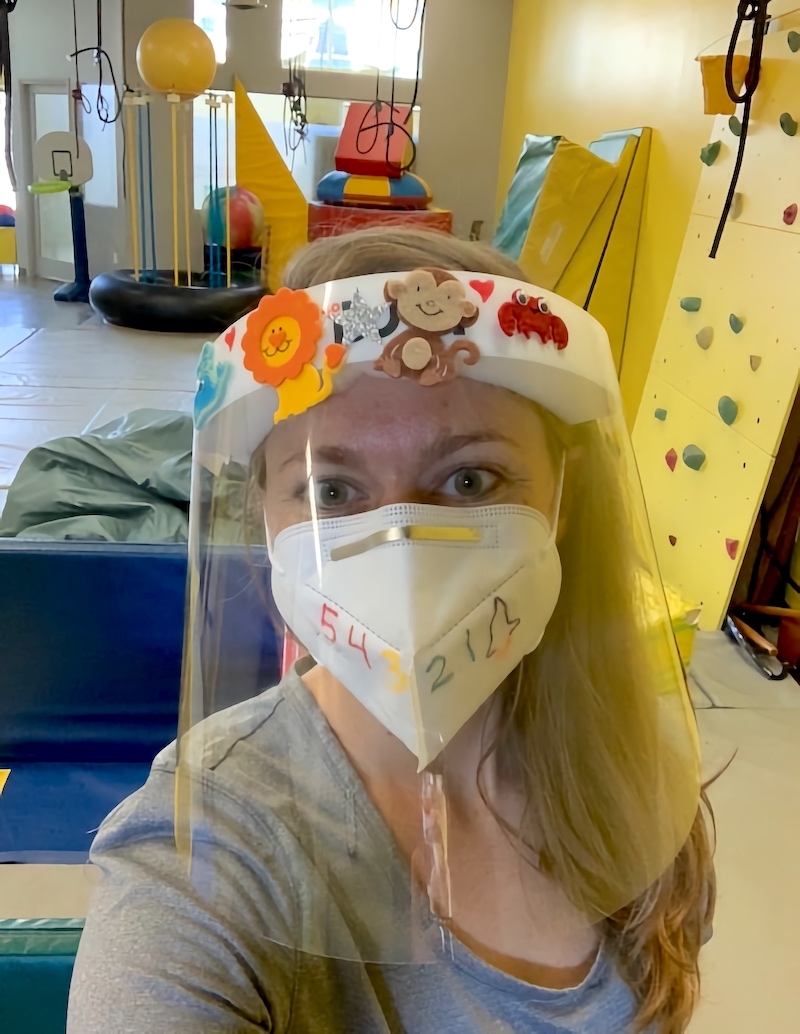
Dani Lurie showing off her decorated face mask and shield that she wears in order to work with children in person at the amid COVID-19.
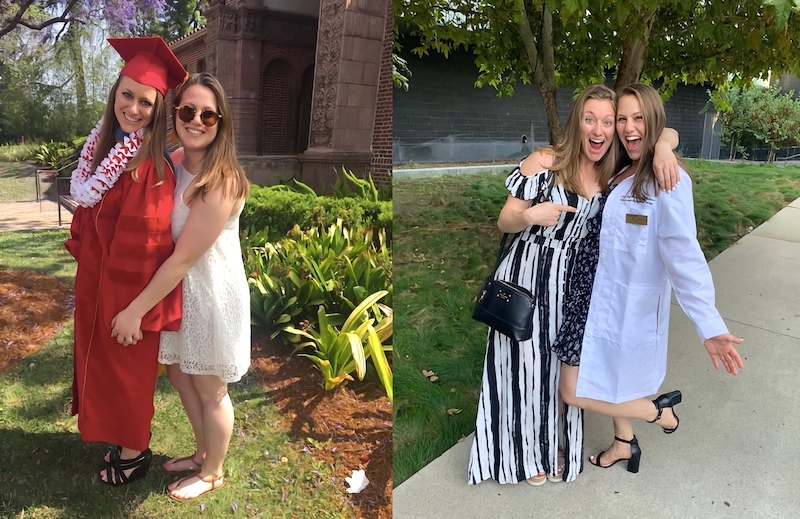
On the left is a photo of me and my sister at her OTD graduation in 2017 and on the right is a photo of us at my White Coat Ceremony in 2019.
⋯
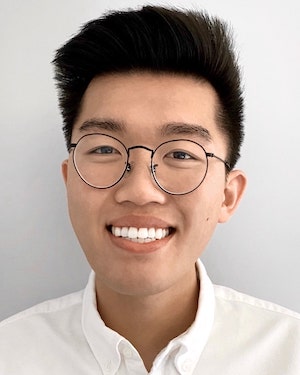
Back To OT School Day ⟩
October 19, 2020, by Calvin
I hadn’t been back to school since like . . . March, which was around the time when we were all informed that courses were going to be moved online due to the pandemic. Ever since then, I’ve missed being with everyone in person, and I also kind of missed sitting in the classroom and being in that learning space. I’m so thankful that the division is allowing students to go back to class on some days because honestly, there are just some things that are learned better in person!
At first, I was pretty hesitant about going back because of the potential risk, but so far it’s been working out great! We’ve learned to be more flexible in order to adapt to this new learning format, and it feels good to see everyone again. Here’s a video on what my first day back to school looked like!
⋯
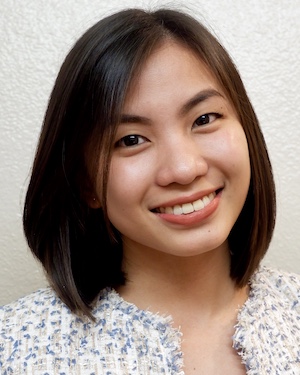
Start Your Applications Early! ⟩
October 16, 2020, by Yna
It is now mid-October and I could hardly believe that it’s already been a year since I submitted my application for the Post-Professional Master’s Program at USC! It seems like it was only yesterday that I was browsing the USC Chan admissions website for hours on end, feeling anxious about my application. Luckily for me, the whole process went by smoothly and didn’t turn out to be as stressful as I had anticipated; and I’m about to share with you some tips that made my application hassle-free:
- Do your research. First and foremost, know what you’re getting into. The Chan Admissions page is a great resource where you can find all the information that you need. I know at first glance it could feel overwhelmingly packed with a lot of information from every tab, so what I did to help myself get organized was I created a document containing all the essential information about the program—location of the school, program duration, admission criteria, etc. Having this document handy makes it a lot easier whenever questions pop up at any time. Venturing onto something new always seems daunting at first, especially if you’ll be coming from a different country, but being informed helps you stay on top of things and consequently alleviate some anxiety you may be having about the application.
- Develop a plan. The application process entails a lot of steps that you can’t just complete all in one sitting. Once you’ve done your research and more or less get a sense of the requirements that you need to complete, it’s now time to create a checklist that will help you better track where you are at, and what else needs to be done. It is of course vital to take note of important deadlines so you don’t miss them. Should you need to take any exams, such as English proficiency, make sure to schedule them as soon as possible to give you some leeway for any potential delays. In doing so, take into consideration not only the length of time you need to prepare for the exam, but also the amount of time it takes for the results to come back (and if the results are going to be sent to you, consider also the time it’ll take you to mail the results to the university, if need be).
- Have your documents ready. This is particularly important if you’ll be coming from a different country—you want to make sure that you have everything that you need on hand before moving. Needless to say, it takes up more time, effort, and resources to be requesting for documents remotely; so before you go, request all the documents you think you may need, and get extra copies! Also keep in mind that for any document that is not in the English language, you may need to have them translated.
- Take time to create your personal statement. Irrespective of how good of a writer you are, really put much thought and effort into crafting your personal statement. Read and absorb the prompt, then answer it with honesty and in a manner that reflects who you are. Don’t feel pressured trying to figure out what they’re looking to read from your essay; instead, draw on your experiences that will make your application stand out. Last but not the least, stay within the word limit and be careful not to overlook any typographical and grammatical errors.
- Explore financial resources. Funding for graduate school can be quite challenging, so take advantage of the many financial resources being offered at USC. Aside from scholarships and awards, there are also student worker positions that you can apply for, with work hours that can adjust to fit around your class schedule. You can find more information in the Scholarships and Financial Aid page.
- Don’t hesitate to ask! If, at any step during the process, you find yourself in need of some clarification about anything, the student ambassadors Bethany, Calvin, Daniel, Lamoni, Liz, Savi, and myself are always willing to provide support!
⋯





